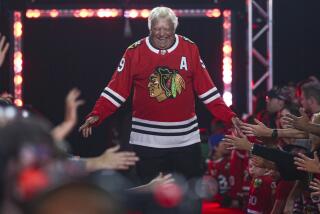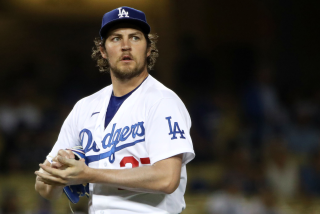Success Has Made Hull Misunderstood Superstar
- Share via
Who is Brett Hull?
Is he the happy-go-lucky player who beams when he scores a goal, or the whiner and complainer who pouts when he doesn’t get his way?
“I don’t care if he’s got 50 goals or 100, you always know when Brett Hull is on the ice,” Montreal Canadiens goaltender Patrick Roy says. “He’s one of the greatest goal scorers in the history of the game.”
But Los Angeles Kings Coach Barry Melrose nixed a trade for Hull last season, saying, “If we had traded for Hull, we never would have made it to the Stanley Cup finals. You win in this game with star competitors, not star players.”
You could say Brett Hull is the Barry Bonds of hockey--a home run hitter in his sport, an electric presence. Fans circle their calendars as a reminder to buy tickets when these players come to town.
But as a result of being placed on such a pedestal, they are subject to scrutiny beyond reason. That’s what makes Hull, like Bonds, one of sports’ most misunderstood superstars.
Hull was the NHL’s most valuable player in 1990-91 when he scored 86 goals, but his total fell to 54 last season, touching off a wildfire of doubt and criticism: He is lazy . . . he would score 100 goals if he were more competitive . . . he is immature . . . he can’t remain focused on the game.
To his credit, Hull is up-front, candid and approachable, despite what at times seems like interminable examination. And that’s where he differs from Bonds, who indicates his mood swings by the color of wrist band he is wearing on a particular day.
“I don’t get upset at anyone or anything but myself and my situation,” Hull says. “People misinterpret that--big time.
“I could say the criticism doesn’t bother me, but no one’s that unfeeling. It does bother me, but I can’t do anything about it.”
The Chicago Blackhawks have just lost for a third consecutive time to the St. Louis Blues en route to a surprising sweep in the first round of the playoffs when Chicago Coach Darryl Sutter steps to the microphone to answer questions.
Sutter scratches his head in obvious frustration when he is asked how the Blackhawks plan to keep Hull from scoring. But Sutter doesn’t spout the company line and say how tough it is to stop Hull. In fact, his answer is a surprising dig at St. Louis’ star.
“Hull? Did he have two shots on goal?” Sutter says. “I’m not noticing him out there except for his goals.
“We were hoping to put Jeremy Roenick’s line head-up against Hull’s line. We thought we could take advantage of that matchup. But (Blues Coach) Bob Berry isn’t using him. We might be up 3-0 in this series if Hull played more . . . but he’s never out there.”
Again, the perception is wrong.
Hull obviously was out there enough to help bury the heavily favored Blackhawks, including a great bodycheck he made on goal-tender Ed Belfour that helped create Craig Janney’s overtime goal in Game 4.
Hull just shrugs when the incident is dredged up with all the other bad memories of last year’s lost season.
“I’m upset about my year,” he says. “I know I could have been better, but I also know that not every year is going to be easy. It’s a year where I learned a great deal about a lot of things.
“I learned that I can’t score when I’m on the bench, I learned I can’t continue to play when I can’t skate because of a stomach-muscle injury that I should have taken more seriously, and I learned that I have to look out for myself because there aren’t many others who give a damn about me, other than my close friends and family.”
Berry knows how important Hull is to the Blues, but there are times when he openly criticizes his star player. After a 6-5 overtime loss in Buffalo last season, Berry ran the videotape over and over again to point out an error Hull made in coverage on Brad May’s winning goal.
“Look at this goal,” Berry said. “Where is Hullie? He’s up here, he’s at the red line waiting for a breakaway. . . . Absolutely no respect for his goaltender.”
Even though Berry and some of Hull’s teammates don’t always seem to know this man, we don’t need to roll out a couch to psychoanalyze him.
“Hullie is a very confident guy, but for the first time, he was doubting himself,” Blues winger Brendan Shanahan says. “And whether you are a superstar or not, you have to be confident in your ability in order to play well.”
Before the playoffs there was a story in the St. Louis Post-Dispatch in which teammates ripped Hull--anonymously, of course. Accusing fingers were pointed at Berry for planting the story to try to get Hull at the top of his game in the playoffs. If that’s true, it worked because Hull had eight goals in 11 playoff games.
Although no one is free from criticism, Hull became frustrated when Berry cut his ice time from 30 minutes a game to around 18 last season.
“I went to Bob Berry this summer and told him I had to have more ice time, that I think the team does better when I play a lot,” Hull says. “I think I can help this team, I want to help this team, but I can’t if I don’t get a chance. I told Bob that if things are going to be like last year, he might as well get me out of here.
“I think we came to an understanding both sides can live with.”
Sometimes it appears Blues fans look for reasons to criticize Hull.
The day before the 1993 All-Star Game last January in Montreal, Hull praised Boston Bruins center Adam Oates for his MVP-like season. He said he missed Oates, he missed all the time the two spent when they were linemates on the Blues. But fans considered Hull’s comments, which appeared in a newspaper story, childish, and they remembered what an outspoken critic of management Hull was during Oates’ messy contract dispute before he was traded to Boston in February 1992.
At the next St. Louis-Boston game, fans booed Oates and Hull.
“I think it’s sad when fans are booing him,” Oates said afterward. “I think it’s sickening. He turned this town on its ear and now it’s turning on him. He gave his right arm for this organization.”
The fact the Blues considered trading Hull to Los Angeles before he signed a new four-year contract in February showed they also took Hull’s contributions to the team for granted--big time.
That was underscored after the Blues swept the Blackhawks in the playoffs and General Manager Ron Caron proudly announced, “Brett has rejoined the team.”
Wait a minute. Hull hadn’t taken a leave of absence. Sure he had no hat tricks last season and contributed only two game-winning goals, but he hadn’t disappeared and he hadn’t stopped trying.
In reality, Hull’s teammates were tickled to death. They continued to look at Hull as a leader and weren’t about to be critical of his performance.
“Kevin Stevens told me that Mario Lemieux is pretty quiet during the regular season,” Janney says. “But when it comes to the playoffs, he steps up. Brett was like that. The great players want to be up with the bases loaded in the ninth inning or fourth and goal in the final minute of play.”
Hull gets frustrated when people say he isn’t competitive, that he looks lazy and isn’t a leader.
“If I wasn’t competitive, I’d be a 30-goal scorer. You can never be satisfied with how you’re playing. This is the NHL, and if you’re content with being a mediocre player, that’s not good. I know it’s not good enough for me.”
More to Read
Go beyond the scoreboard
Get the latest on L.A.'s teams in the daily Sports Report newsletter.
You may occasionally receive promotional content from the Los Angeles Times.






